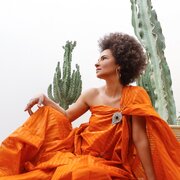- country:Morocco
- region:North Africa
- style(s):Arabic, Mediterranean
- label:MDC
- type:Band
- gender:female
- instrumentation:vocal, percussion, singer songwriter, dance orchestra
- artist posted by:Mad Minute Music
Line up
- OUM (Lead vocals)
Links
Originally from Casablanca, Oum El Ghaït Ben Essahraoui seemed destined to become an architect but then decided to embrace a career in music. She quickly drew the attention of the media, who identified her with the Nayda, a movement of young Moroccans attracted by more urban sounds. The albums Lik’Oum (2009) and Sweerty (2012), which were only released in Morocco, made her a star in her own country. Then she had a crucial brainwave. She began to write in darija, the everyday dialect of Moroccan Arabic. This offered her the possibility of exploiting a new musicality in her lyrics, as well as new combinations of meaning – an entire poetry of assonances. In 2013, she surrounded herself with musical luminaries to release her first international album, Soul of Morocco. European audiences discovered an artist full of generosity who offered a new kind of fusion combined with great authenticity. Concerts followed each other in quick succession, allowing her well-honed group to achieve even greater cohesion. Two years later, Zarabi, recorded at the gates of the Sahara, deepened the aesthetic direction that Oum has chosen to pursue, whilst offering a discourse on the need to preserve nature and traditional micro-societies.
Her new album Dakchi means « that » or “those things”. In this fifth album, Oum celebrates what brings us together, what we share, what we love. Made and recorded in the family stronghold in Marrakech, Dakchi marks a decade of creation and concerts around the globe with faithful musician companions and is also a communion with the moroccan audience who saw the artist begin at home before embarking on an international career. Dakchi recomposes the best songs of the albums Soul Of Morocco, Zarabi and Daba, and offers three new ones. Thirteen tracks where
melodies and polyrhythms intertwine in a pure marrakchi spirit.
Oum positions herself as a Moroccan, an African and a woman of the world who is convinced that cultural barriers are less weighty than that which brings us together. And with that she touches on the spiritual. After all, isn’t Abad, the ‘eternal’ the opposite of Daba, the ‘moment’? On Daba, Oum pursues her quest for music that is universal, a reflection of a troubled world and, at the same time, a balm intended to soothe that world and impart to it an infallible hope.




